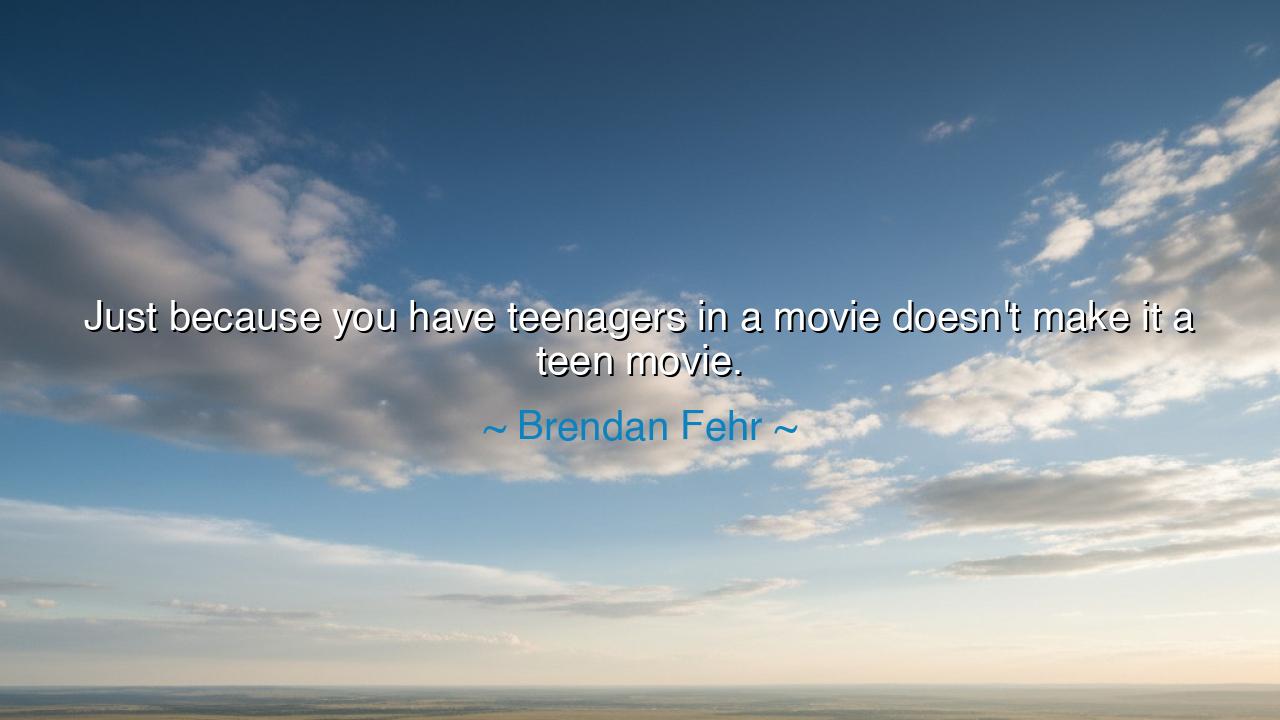
Just because you have teenagers in a movie doesn't make it a






Brendan Fehr once declared: "Just because you have teenagers in a movie doesn't make it a teen movie." These words, though simple in form, hold within them a profound truth about essence versus appearance. He reminds us that the mere presence of an element does not define the nature of the whole. To place youth upon the screen does not in itself create a story of youth, just as to place soldiers in a tale does not make it a war epic. The substance of the narrative, the intention of its spirit, is what determines its nature. This is a call to see beyond the surface and recognize the deeper identity of all things.
The origin of this insight lies in the realm of cinema itself. In the late 1990s and early 2000s, Hollywood was awash with films marketed as “teen movies.” Yet many stories featuring young characters carried weight far beyond the genre—stories of alienation, friendship, grief, or transcendence that spoke to all ages. Fehr, himself known for roles in youth-oriented productions, sought to draw this line: a film may contain teenagers, but if its themes reach for the universal—love, loss, purpose, mortality—then it transcends the narrow boundaries of marketing labels. He cautions us not to confuse the surface of things with their soul.
This lesson is not confined to art. History itself bears testimony. Consider Anne Frank’s diary. Written by a teenager, one might be tempted to label it a “teen journal.” Yet its voice has thundered across generations, standing as one of the most poignant testaments to human resilience, suffering, and hope in the face of unspeakable darkness. To dismiss it as a mere account of youth would be to blind ourselves to its eternal human depth. The truth is clear: it is not the age of the speaker that defines the message, but the depth of the truth within it.
Fehr’s words thus remind us of the danger of labels. Humanity has long loved to categorize: this is youth, this is adult; this is minor, this is great; this belongs here, that belongs there. Yet labels often obscure reality. The greatest works of art, the greatest deeds of history, resist confinement. A tale told by the young may shape the destiny of the old. A song written for one culture may heal the heart of another. To rely only on labels is to remain blind to the richness of the world.
For the individual, this teaching strikes deeply: do not allow others to reduce you to a category. Just because you are young does not mean your words lack weight. Just because you are old does not mean your voice no longer matters. Just because you belong to one group does not mean you cannot speak to another. The true worth of a person, like the true worth of a story, is found not in the shell, but in the substance.
Take this lesson into daily life: when you encounter others, look beyond their roles, their age, their appearance. Ask instead: what truth do they carry? When you create, do not confine yourself to the expectations others place upon you. If you are a youth, let your words speak beyond your years. If you are one overlooked, let your work transcend the boundaries imposed upon you. Like a film that resists its marketing label, so too can your life refuse to be reduced.
Therefore, children of tomorrow, heed Brendan Fehr’s wisdom. The essence of a thing is not dictated by what it seems to contain, but by what it truly expresses. A movie is not defined by its cast, but by its heart. A person is not defined by their age, but by their spirit. Judge not by the surface, but by the depth. For it is in the depths, unseen by labels and untouched by categories, that truth, beauty, and greatness reside.






AAdministratorAdministrator
Welcome, honored guests. Please leave a comment, we will respond soon